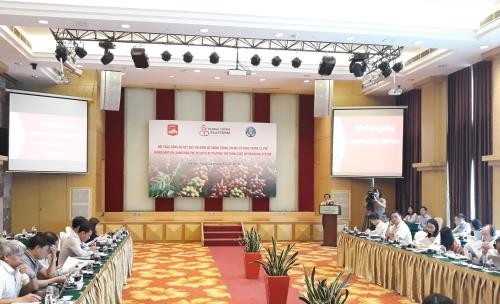- Giới thiệu
- Nhóm Công tác
- Tin tức
- Thông tin về FTA
- Tài Liệu
- Sự kiện
- Liên hệ
Launching of a new identification system for coffee
On May 23, in Hanoi, the Ministry of Agriculture and Rural Development in collaboration with the Global Coffee Platform (GCP) organized a workshop to share the results of the pilot of the identification system for coffee areas.

In 2018, Vietnam’s coffee area has reached 680,000 hectares producing an average yield of 2.5 tons/ha and a total output of 1.62 million tons of green coffee beans. In 2018, Vietnam exported 1.8 million tons with a total value of USD 3.5 billion. With a view to support the development of a sustainable coffee industry, meeting the requirements of international roasters and improving the efficiency of coffee production planning and management as required under the new Law on Crop Production in 2018, the GCP has collaborated with partners, especially the Department of Crop Production, to pilot the identification system for coffee as a tool supporting industry management and evaluating the application of sustainable practices in coffee production. The system has been piloted to collect data of more than 8,500 coffee producer households in Di Linh district, Lam Dong province.
The software will become a digital tool to assist relevant partners in managing coffee gardens with a lot of information on the plantation such as tree age, coffee variety, soil type, water source, irrigation practices adopted, intercropping, which will improve the management and traceability of the coffee industry.
According to Ms. Tran Quynh Chi, GCP Representative, Lam Dong province will work with the Ministry of Agriculture and Rural Development and GCP to develop a roadmap to expand the adoption of the identification system to the whole province. For other provinces, GCP is collaborating with other coffee projects to equip other provinces with the tool so that they can make a decision on the application of the system at a sector level.
The Ministry of Agriculture and Rural Development currently has many programs for sustainable coffee development such as the Sustainable Agriculture Transformation Project in Vietnam (VnSAT). These programs and projects can assist the Ministry in upscaling the system. On that basis, the Ministry of Agriculture and Rural Development can develop guidelines for provinces to build their own budgets and collect data into the system.
According to Mr. Le Van Duc, Deputy Director General of the Crop Production Department, the identification system is a database of electronic household handbook which can help farmers manage their production inputs; certification organizations may inherit to reduce the cost of certification; businesses to trace their input materials, direct investment and financing strategy in coffee production. The system also equip the state management agencies with a database in providing orientation for sustainable coffee development. This can create confidence for processors and consumers about the product origin, quality and safety.
Tin liên quan
PSAV Attends the 30th Anniversary Celebration of Cargill Vietnam2025/10/23
Plant health management helps increase coffee yield up to 15%2025/10/16
An Giang to host 2025 OCOP forum for sustainable development2025/09/25
Viet Nam and France foster cooperation on blue economy and sustainable environment2025/09/29
Agriculture and Environment exhibition ready for National celebration2025/08/27



 Điều lệ hoạt động
Điều lệ hoạt động



















































